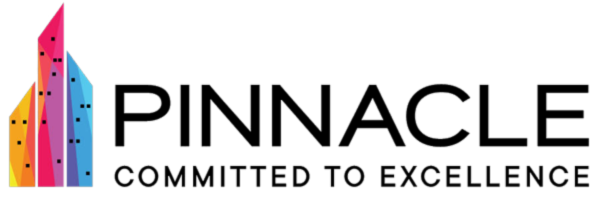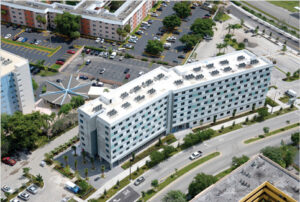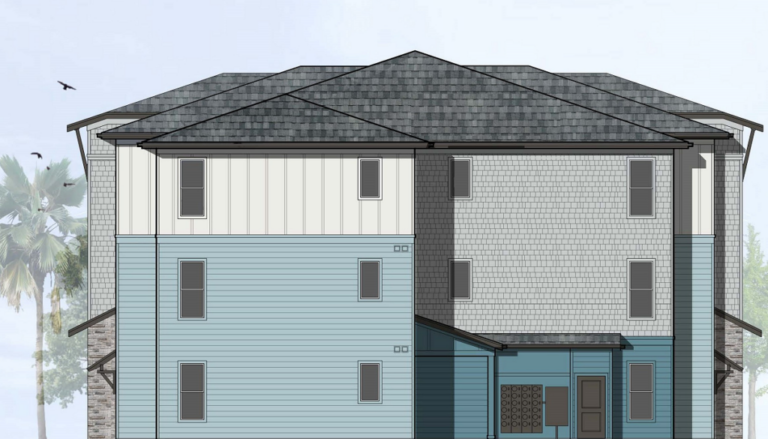Miami Today | By John Charles Robbins | September 17, 2019
The folks at Pinnacle Housing Group are proud to be delivering a brand new affordable transit-oriented development for seniors in South Miami-Dade County within a month’s time.
Caribbean Village is seven stories and home to 123 residential units.
The project is a public-private partnership between Pinnacle, the South Miami Heights Community Development Corp. and Miami-Dade County. The county owns the site at 19755 SW 110th Court.
The project is unique for two other aspects: Pinnacle is constructing a surface parking lot right next door as a “Park and Ride” facility for Miami-Dade County Transit, and the senior housing community will be accented with several large art installations as part of the Miami-Dade Art in Public Places Program.
David O. Deutch, a co-founder and partner at Pinnacle, told Miami Today this week that the project is 93% complete and will open next month.
“It’s a reality, 123 senior affordable homes delivered in a matter of weeks. We’re very excited,” he said.
Mr. Deutch said Pinnacle is in the business of providing much-needed affordable housing options.
“Pinnacle has devoted the last 20 years to providing high-quality affordable housing to residents of Miami-Dade County. The need for that housing is more acute today than ever, and it’s exciting to be delivering Caribbean Village to the residents of South Miami-Dade County,” he said.
Construction on the project began in August 2018.
Pinnacle is co-developer with South Miami Heights Community Development Corp. PHG Builders LLC, a Pinnacle affiliate, is the general licensed contractor.
As is the company’s practice, a third party architectural firm was hired for the project: Behar Font & Partners, P.A.
This 123-unit community targeting seniors is part of a two-phased plan to develop transit-oriented affordable housing along the South Dade Busway along US 1, with direct busway access to Metrorail and public transportation throughout greater Miami, and will be the first new affordable seniors housing in this area in 25 years.
The county competitively procured Pinnacle and the South Miami Heights CDC to develop this property. In addition to contributing land, Miami-Dade County has loaned nearly $11.5 million in funds earmarked for affordable housing and economic development.
County officials say the project is the fulfillment of the county’s promise to deliver quality housing for fixed-income seniors and to spur redevelopment in South Miami Heights, while taking advantage of the county’s investment in transit.
Caribbean Village benefits from public-private financing partnerships through the issuance of tax-exempt bonds, an allocation of housing tax credits and a $5.3 million loan from Florida Housing Finance Corp., with Citibank N.A. purchasing both the bonds and the tax credits.
Mr. Deutch said interest in the project is substantial, and that tenants will be chosen on a first-come first-served basis.
“We are getting calls every day. People are very exited about the opportunity to live at Caribbean Village,” he said.
The building will have 123 standard full-sized residential units, one- and two-bedroom apartments, and rental rates will range from $420 to $1,078 a month, said Mr. Deutch. It will be for eligible persons age 62 and older.
Amenities include a fitness center, cyber lounge, game room, and an outdoor recreation area with covered barbecue and picnic tables. Free wifi will be available in all common areas for residents.
The building includes office space for the South Miami Heights CDC.
Once fully complete, including the many finished areas of artwork required in the public-private partnership, the building will be a “gorgeous, high-quality community,” Mr. Deutch said.
On one side of the project is a surface parking lot for 120 vehicles for the residents. On the other side of the building will be the county’s transit parking lot with 100 spaces.
As for the art components at the building, the county is playing a very active role in procuring the artists and overseeing the installations, Mr. Deutch said.
“Their program is driving our art program at this building,” he said.
Handling the art in public places initiative at Caribbean Village for Pinnacle is Jennifer Sanz, vice president of development programs.
Ms. Sanz explained that a county ordinance requires a percentage of the total development costs be set aside for art in public places at the site.
Pinnacle’s investment in art for this project is about $400,000, she said, and part of the company’s long-term lease of the county property.
The county requested proposals, calling for artists interested in this project, and received more than 100 responses.
Ms. Sanz said Pinnacle identified areas of the building and site where art components could go, and had a role in preparing the request for proposals.
“Because of the nature of this project, we really wanted this to be local artists,” she said.
“We identified places where the art could go … the uses and purposes of each of the community spaces,” Ms. Sanz said.
A county committee determined the finalists.
“We didn’t have much of a say in that,” she said, “and those finalists came back to the committee with specific plans and the artists were narrowed down to the final four.”
Ms. Sanz spoke highly of the work being done in the main lobby, which will showcase a massive curved mural inspired by the Everglades.
“It’s going to be beautiful,” she said. The art installations include everything from murals to hand-drawn artwork, tile work and even a glass chandelier.
The public art commissions at Caribbean Village are in partnership with Miami-Dade County’s Department of Public Housing and Community Development, said Amanda Sanfilippo Long, director of the county’s art in public places program.
The four commissioned artists for the project, she said, are Deon Rubi, Christina Pettersson, Karen Rifas and Magnus Sodamin.





